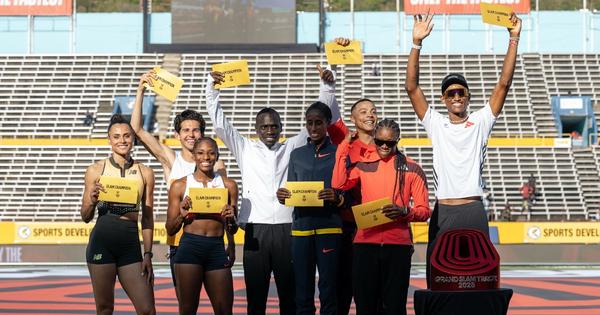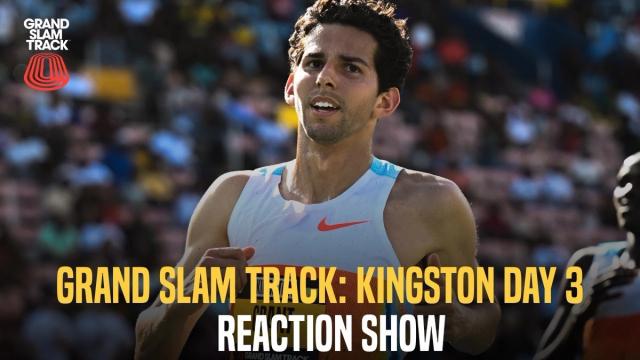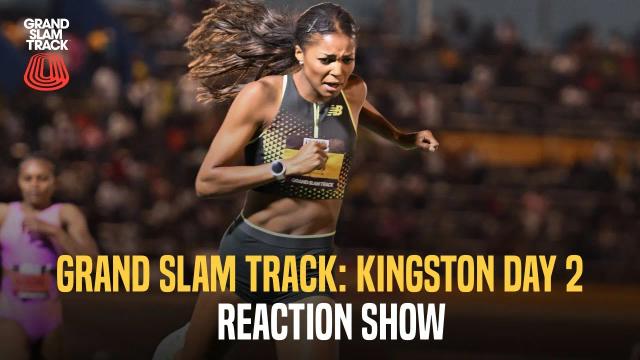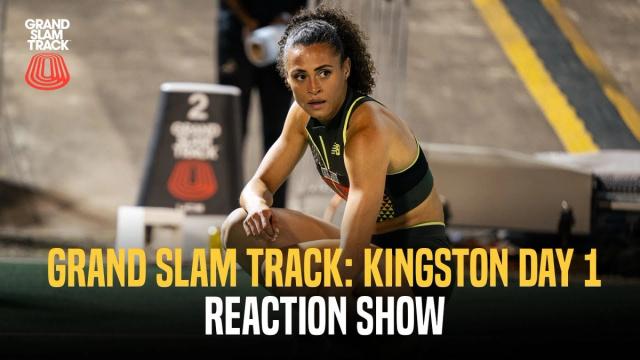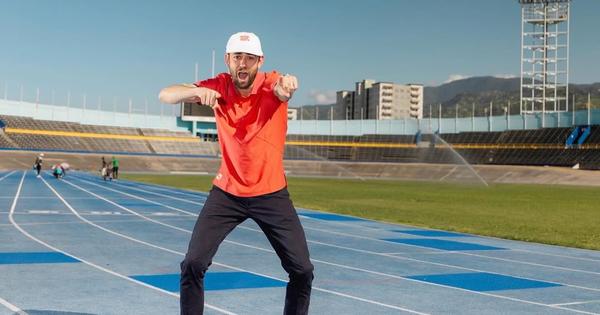By David Melly
April 9, 2025
Going, going… gone! It’s a Grand Slam!!
The first edition of running’s version of a Grand Slam—the track meet kind, not the stock-market-plunging kind—is officially in the books. The ribbon was cut, and Kingston, Jamaica, served as an able host for the inaugural professional track showcase cooked up by Michael Johnson. Just as significantly, the checks were cut, as GST handed out over $3 million in prize money across 24 events and three days of competition. The new meet format was given its first test, and generally speaking, it passed with flying colors.
In many ways, the first episode of GST was like The White Lotus (don’t worry; no spoilers): a star-studded ensemble came together in an exotic location with ample wealth to throw around and underwent a potentially transformative experience. Some people got a happy ending, and others didn’t, but everyone left the island with the direction of their lives altered.
While the level of competition was strong across every event group (11 of the 12 Slam champions were World/Olympic medalists), the most memorable moments were those where the GST format delivered race results that would never have happened otherwise. Olympic champs Gabby Thomas and Marileidy Paulino went head-to-head in the long sprints—and both got beat by Salwa Eid Naser’s incredible 48.67 run in the 400m. Another matchup of Paris gold medalists yielded surprising results as 800m champ Emmanuel Wanyonyi won the Short Distance 1500m over Cole Hocker and a handful of other world-class milers, but then got beat by rival Marco Arop in his specialty event.
Olympic bronze medalist Melissa Jefferson-Wooden ran—and won—her first 200m in well over two years to claim the Slam title in the women’s short sprints. It’s a safe assumption that the only reason we got a look at Jefferson-Wooden in any event besides her 100-meter specialty is because it was required, and yet she got a major victory out of it. And it’s equally safe to assume that nobody anywhere in the history of the world has ever picked up $100,000 for running an 8:03 3000m and a 14:39 5000m—until Grant Fisher successfully gamed the GST system to entertaining results, unleashing an especially furious version of his well-honed kick to win what was almost a caricature of a tactical 5000m, then strategically beating the correct foes in the 3000m to land atop the long distance standings.
And for those who always root for the underdog on the starting line, fear not: there was plenty to celebrate beyond first place finishes, in large part because finishing second in a Slam still sends you home with $50,000 in your gift bag. Unsponsored hurdler Dylan Beard proved he can win big races outside of the Armory, taking down the field in the Short Hurdles 110H with a 13.29 run then finishing third in the flat 100m to land in second place on the podium. World Indoor champ Chris Bailey, who won an Olympic gold before signing his first pro contract, channeled his indoor fitness into a 400m win over three sub-44 runners.
One week ago, last-minute withdrawals led to Jenna Prandini getting a very lucrative phone call, as she finished both the 100m and 200m in Jefferson-Wooden’s shadow to take second place in the women’s Short Sprints. At 32 years old, Prandini (long an unsung hero of the Team USA 4x100m squad) is having one of her strongest starts to the season in years—and now she’s getting paid handsomely for it.
But perhaps the most heartwarming storyline of all was 35-year-old Dalilah Muhammad, the 2016 Olympic 400H champion and former world record holder, announcing that 2025 would be her final season then proceeding to finish second in the long hurdles category behind the woman who’s followed in her footsteps, Sydney McLaughlin-Levrone. Muhammad is a generational talent and four-time global champion who’s well-liked and respected in the track and field community, so it’s great to see her receive the recognition and farewell she deserves even as the dominant reign of Sydney continues.
The range of results helped serve as a proof of concept for GST: there were slow results and world-leading times, displays of dominance and surprising upsets. Three of the twelve Slams were won by Challengers; five of the twelve Champions swept both their events—roughly in line with what the competition-focused narrative and “only the fastest” branding promised. Despite the shade thrown on the “global” cred of GST, the Champions came from seven different countries across four different continents.
A common and valid critique of the Diamond League setup is that the fields and format can produce similar outcomes over and over, reducing unpredictability and, with it, excitement. With only a sample size of one Slam, it’s too soon to know if GST will be as variable and wide-ranging in its outcomes as this weekend would suggest, but there’s some initial evidence to support the notion. The men’s 800m was slow and the women’s 800m was fast; the men’s 5000m ended with a dramatic sit-and-kick but the 3000m, with all the same players, was strung out early. Gabby Thomas set a lifetime best in the 400m but Sydney McLaughlin-Levrone jogged a 50.32. Some of this was due to the weather—it was warm and windy all weekend—but as more Slams come and go, it wouldn’t be surprising to see a much wider range of race styles and outcomes than many other professional meets.
Don’t get it twisted: the inaugural Slam was not a flawless debut. The optics of a large, but far from packed stadium on the first day of competition were awkward, to say the least. The heat surely did irk some of the distance runners, and even the most “time doesn’t matter” diehard can acknowledge that a 4.7m/s headwind in a 200m is less than ideal. Whether Fisher’s gaming of the long distance format is a sign of the incentive structure’s success or an intrinsic failure is a point of contentious debate, and in the women’s long distance category, the large gaps in the small field made for challenging television. While we were thrilled to see track and field competing alongside March Madness on sports bar TVs around the U.S., the broadcast did experience some technical glitches and the pre-show could use some tightening up.
But none of these bumps in the road are insurmountable; they’re growing pains reflective of taking a very big swing right off the bat. The Grand Slam has grand ambition, and that’s a big part of why track and field observers are viewing it with such scrutiny. Showing up on day one self-identifying as a competitive alternative to existing formats and a game-changing expansion of the sport is really setting the bar high for yourself—so high that it’s nearly impossible to clear in one leap.
The ultimate success or failure of GST hinges on another one of its fundamental bets: that the format will cause athletes and fans to think more holistically about how these meets connect to one another over the course of the season. If and when one of the Short Distance men takes the Miami 1500m out at sub-3:30 pace, we’ll know it’s with Wanyonyi’s 3:35 victory fresh in the rearview. There are plenty of Short Hurdlers who will start carving out more time in practice to work on their 100-meter drive phase after this weekend. And the pros who came home from the Miramar Invitational empty-handed might be a little jealous of their colleagues’ bank accounts this week.
Similarly, the GST organizers now have a whole weekend’s worth of experience, data, and feedback to begin the process of tweaking the overall package with the goal of getting more butts in seats and more eyeballs on screens. There’s a careful balance to be struck between giving this fresh concept a little room to breathe and sort out its rookie year hiccups—heck, even two days between Friday and Sunday made the scoring format feel a lot more digestible—and recognizing legitimate opportunities for change and improvement. The jury’s still out on whether GST knocked it out of the park, and in some ways, the second Slam may be more indicative than the first on the long-term viability of the league.
Ultimately, Grand Slam’s first at-bat felt more like a stand-up double, but hey—they got on base. And any good baseball-track crossover fan knows that you can’t win the World Series or change track and field with one great weekend; you need to build a foundation of solid, repeatable success that gets you through the season. GST has a runner on second now, and from what we’ve seen so far, we like their chances to score.

David Melly
David began contributing to CITIUS in 2018, and quickly cemented himself as an integral part of the team thanks to his quick wit, hot takes, undying love for the sport and willingness to get yelled at online.
